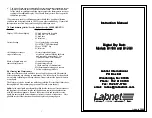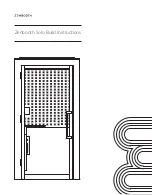
Trigenflex R96
Ceiling, Wall, Standmodel
Dr. Mach
Lamps and Engineering
59230001
Edition 01
18.02.2002 / Bak Page 8/23
3. Cleaning
3.1 Sterilisable handle
At delivery the lamp is equipped with the
handle
sleeve 1
. The handle sleeve is removable and ster-
ilisable. Before using the first time and before every
use the handle sleeve must be cleaned, disinfected
and sterilised.
The handle sleeve must be removed for sterilisa-
tion:
•
To remove press the
lock V
and pull off the
sterilisable handle sleeve
1
while keeping the
lock pressed.
•
To attach, push on and slightly twist the handle
until the
lock V
engages securely.
Handles often become unsterile during an OP;
therefore always keep additional handles available
for exchange.
V
8
Cleaning / disinfection and sterilisation
Basics
Efficient cleaning / disinfection is an essential requirement for effective sterilisation of the handle.
Within the scope of responsibility for the sterility of the products it should be noted that only sufficiently
validated equipment and product specific processes are used for cleaning / disinfection and that the vali-
dated parameters are complied with in every cycle.
In addition, the hospital / clinic hygiene regulations must be observed.
Cleaning / disinfection
Cleaning and disinfection must be carried out immediately after use.
A mechanised process (disinfector) should be used for cleaning / disinfection. The efficiency of the proc-
ess used must be recognised and validated in principle (e.g. listed under disinfectants and disinfection
procedures tested and recognised by Robert-Koch-Institute / DGHM).
When using other procedures (e.g. a manual procedure), proof and process efficiency in principle must
be provided within the scope of validation.
Proof in principle of the suitability of the handles for efficient cleaning / disinfection was provided using a
cyclic cleaning system (Netsch-Bellmed T-600-IUDT/AN, programme 2 for small parts; code B).
It is not allowed to use agents / disinfectants, which contain the following substances, as these may
cause changes in the material:
-
High-concentration organic and inorganic acids
-
Chlorinated hydrocarbons
-
2-ethoxyethanol









































